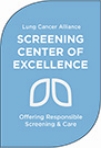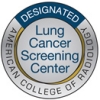Lung Cancer Screening and Early Detection
Low Dose CT Chest Screening (LDCT) for High Risk Patients
Lung cancer is the most prevalent and lethal of all cancers, as symptoms often don't appear until the cancer is already in a late phase. That's why it's critical that high-risk patients get regular lung cancer screenings, so that cancer can be found in its earliest phases, when it's much easier to treat.
In 2010, the results from the landmark National Lung Screening Trial (NLST) showed 20% fewer deaths from lung cancer for those in the high-risk population who had received a low dose CT chest screening (LDCT).
Low dose computed tomography (CT) scans use computer-controlled x-rays to create cross-sectional images of your lungs. The scan is quick, painless, and involves minimal radiation exposure. You can even eat before and after the scan, and no medications are needed.
Eligibility criteria to receive an LDCT screening include:
- Ages 50-77
- No current signs of lung cancer
- Tobacco smoking history of 20 pack years (# of packs/day times # of years smoked)
- Current or former smoker who quit within last 15 years
If you meet all the eligibility criteria above, you should talk to your doctor about whether a lung cancer screening is right for you. If eligible, this screening is typically covered by most insurance plans, including Medicare. Need a primary care doctor?
For more information about our lung screening program, call (925) 674-2581.
Need to quit smoking? You can also contact the California Smokers Helpline at 1-800-NO-BUTTS or visit their No Butts website.
International Early Lung Cancer Action Program (I-ELCAP)
Pioneering our own program for tracking at-risk patients, we have been participants in the International Early Lung Cancer Action Program (I-ELCAP) since 2007 and have developed the in-house Pulmonary Nodule Program. This program proactively tracks patients who receive abnormal imaging test results (such as chest x-rays, CT scan or chest CT) and notifies their physicians when those patients need follow-up exams.
With lung cancer being the leading cause of cancer-related death in the United States, early detection is critical. It is important to see your doctor if you are experiencing certain symptoms or have certain risk factors, such as a history of heavy smoking—even if you've already quit.
Through our participation in the I-ELCAP early lung cancer detection study, we have been able to detect a patient's lung cancer before symptoms develop.
To be eligible for participation, you must:
- Be between 40-80 years old and not be pregnant
- Currently smoke or have a long history of heavy smoking
- Have smoked a minimum of 1 pack/day for 10+ years or 2+ packs/day for 5+ years
- Or have an immediate family member with lung cancer
- Or have been exposed to radon gas or asbestos
- Not have new symptoms related to the lungs, but chronic cough or shortness of breath won't disqualify you, so long as these aren't recent changes
- Not have a history of lung cancer or metastases, or cancer of another organ within five years of entry into the study (although non-melanoma skin cancer is okay)
- Not have had a CT within the prior 24 months
If you meet all of the above criteria and would like to participate, you will:
- Sign an Informed Consent to participate in the research study
- Agree to pay the cost of a Low Dose CT for an initial baseline screening, with a minimum of one follow-up annual CT. Each CT is $375. Grant funds may be available for eligible low-income participants to help cover this cost.
- Research staff will contact your personal physician to order the CT. Your physician will receive the results of the exam and go over them with you.
If you are interested in participating in this study or would like more information, please call (925) 674-2660.
Awards & Recognition

John Muir Health has been recognized as a “Center of Excellence” by the Lung Cancer Alliance for providing high quality responsible screening.

John Muir Health has been accredited by the American College of Radiology as a designated Lung Cancer Screening Center of Excellence.